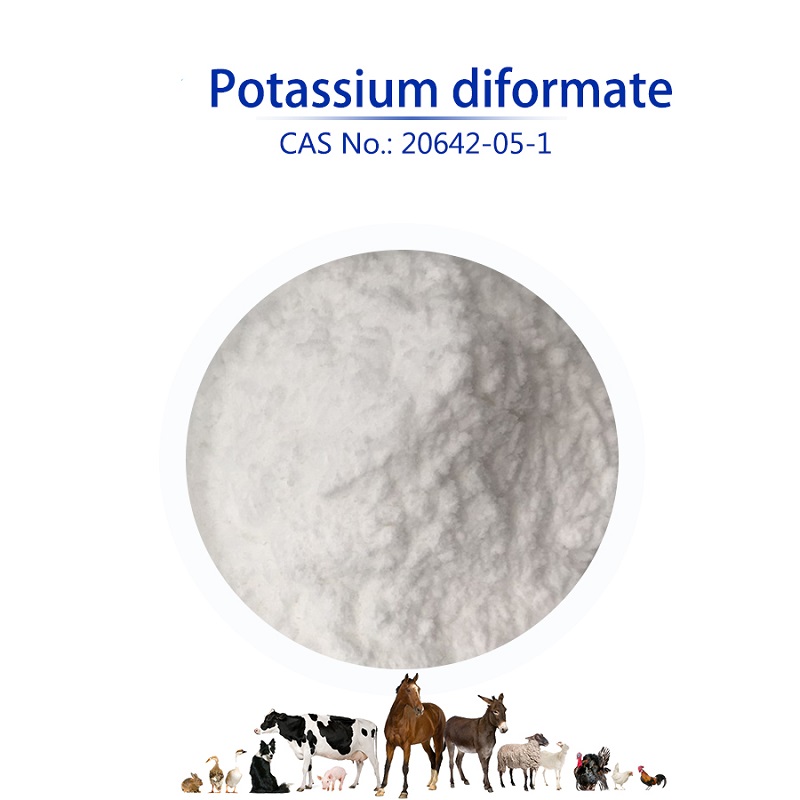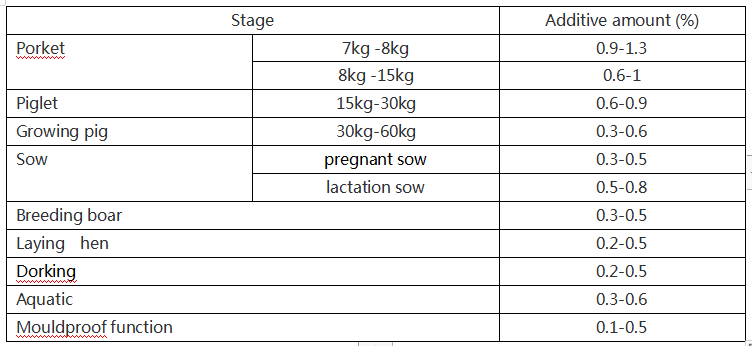Action mechanism of potassium diformate as non-antibiotic feed additive
Potassium Diformate -European Union approved non-antibiotic, growth promoter,bacteriostasis and sterilization, improve intestinal microflora and promote intestinal health.
Potassium diformate is a non-antibiotic feed additive approved by European Union in 2001 to replace antibiotic growth promoters,It is a good substitute for antibiotic growth-promoting agent and has good bactericidal property to escherichia coli, Salmonella and so on. The European Union has banned the addition of antibiotics in feed since January 1, 2006, and China has adopted legislation to ban antibiotics.Therefore, the search for safe and reliable non-antibiotic growth promoters has become the focus of feed additive research. At present, potassium dicarboxylate has been widely used in feed in the European Community, Switzerland, Norway and other regions and countries, and the application research in China has also received great attention.
Physical indicators and characteristics:
English name : potassium diformate
Cas No: 20642-05-1
Assay:98%
Moisture: ≤2.0%
Pb:≤0.001%
As:≤0.0002%
molecular formula: HCOOH·HCOOK
molecular weight: 130.14
Melting point: 105℃-109℃,decompose easily at high temperature,the decomposition temperature is 120℃-125℃
Appearance: white crystal powder, good dispersion and moisture absorption,soluble in water
Action mechanism of potassium diformate:
The action mechanism of potassium diformate is mainly the action of small organic acid formic acid and potassium ion, which is also the basic consideration of eu approval of potassium diformate as an antibiotic substitute.
The addition of potassium dicarboxylate in pig feed as a growth promoter is important because of its safety and antibacterial properties, both based on its simple and unique molecular structure.Its main components formic acid and potassium formate, both naturally occurring in nature and pig intestines, are eventually metabolized and decomposed into CO2 and water, which are biodegradable。Potassium diformate is not only highly acidic, but also released slowly in the digestive tract, which has high buffering ability and can avoid excessive fluctuations in the acidity of the gastrointestinal tract of animals。Studies have shown that 85% of potassium dicarboxylate enters the duodenum in its intact form through the pig stomach. The recoveries of formate in duodenum, anterior jejunum and middle jejunum were 83%, 38% and 17% respectively。It can be seen that potassium diformate mainly acts in the anterior portion of the small intestine。The release of potassium ions can also improve the utilization of lysine.The unique anti-microbial function is based on the combined action of formic acid and formate.
Organic acids per unit weight are more acidic than monocarbonate and have strong antimicrobial properties. The unionized formic acid can pass through the bacterial cell wall and dissociate in the cell to lower the pH value。Formate anions break down bacterial cell wall proteins outside the cell wall, playing a bactericidal and reducing role in bacteria such as E. coli and Salmonella.
The main nutritional functions and effects of potassium diformate:
(1)Improve digestive tract environment, reduce stomach and small intestine pH value, promote the growth of beneficial bacteria;
(2)As a substitute for antibiotics, potassium dicarboxylate can significantly reduce the content of anaerobic bacteria, Escherichia coli and salmonella in digi of digestive tract. Improving animal resistance to disease; And reduce the number of deaths from bacterial infections.
(3)Production of green non-resistant feed, reduce environmental emissions; Potassium diformate can promote the digestion and absorption of protein and energy, and improve the digestion and absorption of various trace components such as nitrogen and phosphorus.
(4)The daily gain and feed conversion rate of piglets can be significantly improved by controlling the diarrhea of piglets. Because of its special slow-release properties, its acidizing effect is better than that of common compound acidifiers.
This product has remarkable effect in pig, aquatic animal and poultry production. It can be made into premix and premix first, and used after being mixed evenly with other components of compound feed, or directly mixed evenly with each component of compound feed.



